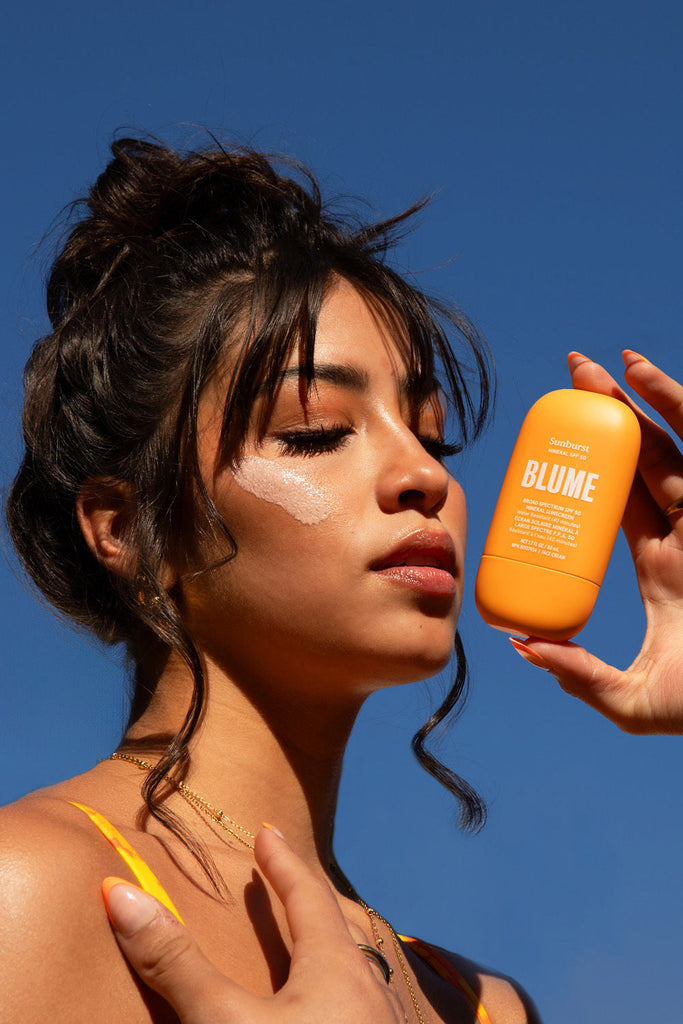When it comes to skincare essentials, sunscreen is a non-negotiable. Whether you're heading outside or working by a sunny window, SPF is your skin’s daily BFF. But if you’ve ever paused in the sunscreen aisle wondering about the difference between mineral and chemical sunscreen, you’re not alone.
At Blume, we're all about clean, effective skincare, and that includes helping you make informed choices. Let’s break down the two main types of SPF so you can find the one that’s best for you.
☀️ What Is Mineral Sunscreen?
Also known as physical sunscreen, mineral sunscreen acts like a shield. It sits on top of your skin and reflects UV rays away like tiny mirrors.
Common Ingredients:
-
Zinc oxide
-
Titanium dioxide
These naturally derived minerals provide broad-spectrum protection from both UVA and UVB rays. Mineral sunscreen is often the go-to for sensitive or acne-prone skin (hi, that’s us!).
🔬 What Is Chemical Sunscreen?
Chemical sunscreens work differently. Instead of blocking UV rays, they absorb them into the skin and convert them into heat, which is then released.
Common Ingredients:
-
Oxybenzone
-
Avobenzone
-
Octinoxate
-
Homosalate
Chemical SPF formulas are usually more invisible on the skin and they tend to feel lightweight and silky.
⚖️ Mineral vs. Chemical Sunscreen: Key Differences
Here’s a quick breakdown to help you decide which is right for you:

✅ Pros and Cons of Each Type
Mineral Sunscreen Pros:
-
Clean, natural ingredients
-
Ideal for sensitive skin
-
Instantly effective (no wait time)
-
Reef-safe and eco-friendly
Cons: May feel thicker on the skin
Chemical Sunscreen Pros:
-
Lightweight, invisible finish
-
Spreads easily under makeup
-
Often water-resistant
Cons: Can irritate skin; not always reef-safe
🌿 Which Sunscreen Is Best for You?
Here’s how to choose:
-
Sensitive or breakout-prone skin? → Go mineral (especially zinc-based)
-
Worried about a white cast? → Opt for a tinted mineral like Sunburst or lightweight chemical option
-
Looking for clean, non-toxic skincare? → Mineral wins again
-
Big on ocean safety? → Choose reef-safe mineral formulas
At Blume, we believe skincare should be gentle on your skin and the planet. That’s why we lean into clean, cruelty-free, and eco-friendly ingredients across all our products and encourage SPF choices that do the same ☀️
💬 FAQs
Does mineral sunscreen leave a white cast?
Sometimes, especially if it’s not tinted. But many clean brands (hint: keep an eye on us 👀) are creating more blendable, sheer options.
Can I use chemical sunscreen every day?
Yes, but be mindful of ingredients like oxybenzone, which can be irritating or hormone-disrupting for some.
Is mineral sunscreen reef-safe?
Yes! Zinc oxide and titanium dioxide (non-nano) are considered reef-friendly.
No matter your skin type or routine, daily SPF is a must. The real win? Choosing a sunscreen that fits both your skin’s needs and your values. Stay glowy, stay protected ☀️


